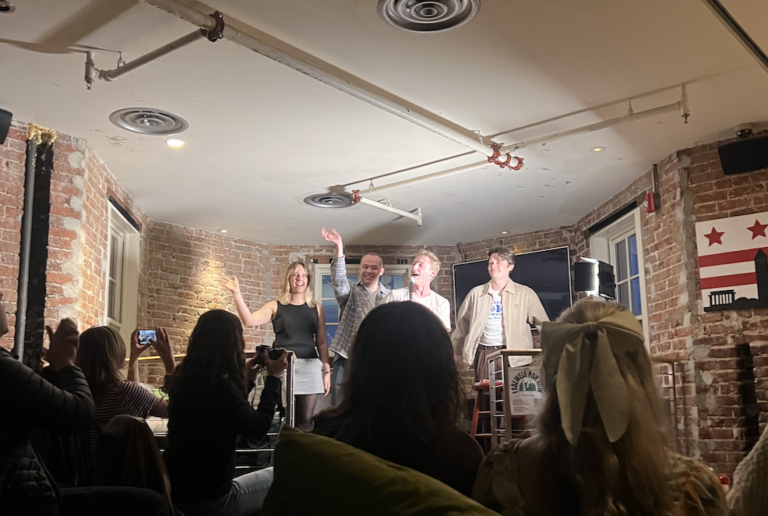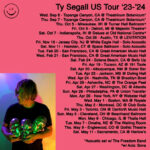Performance trio Max Davidson, Margaret Korinek and Will Roberts put on their last joint show at Tonic at Quigley’s on Saturday, April 6, bringing an era of magic and comedy at GW to an end.
Davidson, Korinek and Roberts have transformed the student comedy scene over the last three years. During Robert’s sophomore year and Davidson’s senior year, they ignited curiosity by sticking QR codes around campus with the question ‘are you happy here?’ attached. It was an intriguing and relevant question for a group of students returning to life after a year of pandemic induced isolation. Linked was the info sheet for an open mic night where amateur comics and performers could get first-time experience in front of crowds on the top floor of the Hillel building. I was able to see multiple of these open mics. Despite being somewhat clandestine, there were big turnouts. Attending felt like discovering an exclusive ‘if you know you know’ scene just beginning to grow.
The high turnout indicated a craving for comedy on campus, which led Korinek to found an official org called GW Comedy Nights. She organized shows for bigger audiences in Lisner Downstage with more publicity, postering graphics and reminders on streetlights and dorm building walls. Eager crowds crammed together on the floor without complaint and the young performers gained greater conviction. Comedy Nights gave students an entertaining way to spend an evening and comedians access to a generous, rapt audience.
Davidson graduated from GW in 2022 and moved to New York to become a full-time magician. He has returned to GW on multiple occasions to put on a unique show at Tonic with Korinek and Roberts—a riveting and hilarious combination of jokes and magic tricks. The two Saturday shows, one at 6:30 and another at 9:00, marked the final iteration of this particular event since Korinek and Roberts graduate in May.
There was an air of reunion and celebration in Tonic. Every table and couch in the narrow bar were filled by students, friends and even a few SMPA faculty. Hellos and hugs were given as the first of two shows that night began for the last time. The 6:30 show was hosted by another GW alum and New York comedian, Sam Schaefer. His flow and tone were that of a seasoned professional—slick and conversational.
“Having a newly divorced father has now turned me into a single mother,” he joked.
Margaret Korinek was the first headliner to take the stage. She bounded up with familiarity, giving the crowd a warm “hey guys!” before her set. She carried a bright, down to earth energy throughout. Watching Korinek perform feels like listening to your funniest friend recap their week—she is, and has been since the first open mic nights, a complete natural. Over the last few years Korinek has found a unique voice and style, doing little spins during her joke transitions and letting out a playful giggle at her own deliveries. She has created the kind of singular, memorable quirks and mannerisms associated with the most successful of comedians.
Korniek’s set focused on topics relatable to most of the crowd: being a college senior wondering what your tangible skills are, dating in your twenties (being a comedian leads to many joke-offs with unfunny men in Tatte) and apartment hunting (we’ve all had to deal with a stoned property manager named Lenny/Mikey/Bobby). The cheekiness and brevity of her delivery was met with tons of laughs and more than one round of applause—thanks to her paying her friends to clap, she quipped.
After Korinek’s well-received set, Roberts took the stage in one of his best performances to date. He has forged the ideal balance between self-deprecation and self-assurance, inviting the audience to laugh at his shortcomings and embarrassing snafus while remaining in complete control of the crowd. The entire set was well-rehearsed and timed with seamless transitions—especially when telling stories of his childhood. In one highlight, he recalled the misery of being a kid trying to get out of a pool without a ladder.
“You’re twelve years old, all your friends are already out, arms shaking, swim shirt stuck to chest, trunks falling down to reveal ass,” he joked, acting out the scene emphatically.
The success of Roberts’s jokes is that they don’t end with a simple punchline, but instead describe a vivid, detail-laden picture of each phase of his life. His delivery encourages the audience to embrace his embarrassments, and their own, and laugh them off together.
The final act of the night was Max Davidson. Despite primarily being a magician, Davidson is also very funny. He could relate to the audience as a former GW student—knowing what it’s like to fly into Reagan and thinking you’re going to “9/11 into the Washington monument—but you never do!”
Davidson can read minds. Or at least he spends the majority of his act making you think he can. For his first trick, he asked three people in the audience to put stats from a recent Strava run in a sealed envelope. By focusing hard on each runner, Davidson was able to name where the run took place, the route and other impossible details.
It only escalated from there. By the end of the night Davidson was simultaneously solving a Rubik’s Cube blindfolded, naming the teams and MVPs of Super Bowls chosen by the audience and correctly guessing a lengthy number written on a pad of paper by a row of attendees. All of these activities are completely unrelated—making the performance in its totality exhilarating and unpredictable. The image of Davidson standing on stage, unable to see while shouting out football players is so ridiculous it’s brilliant.
Davidson ended his set by revealing how he memorizes numbers and facts— a secret you’ll have to see him in New York to learn. In a final demonstration of that ability, Davidson scanned all of our faces and was able to name every single person in the packed bar. He addressed each of us directly, looking into our eyes before calling out our name. It made the audience feel like they were a part of something that can never be recreated.
“Here’s the honest reality: memorizing Super Bowls or whatever, Rubix’s Cubes, it’s nice but it doesn’t really get you anywhere. The actual thing you have to do if you’re gonna try and memorize things and have it matter, is memorize the people that you meet and I met a lot of you tonight,” he said, calling out everyone’s names.
The trick doubled as a poignant display of the ephemeral community that’s been created at GW thanks to these events. Davidson encouraged the audience to join him in reflecting on the people met, the friendships made and the laughs shared.
The show was a triumphant testament to how these three performers have improved as entertainers, serving as a finale to a three-year-long chapter of GW’s comedy scene. Through their example and guidance, the next student comedians are sure to carry on that legacy. Walking out of Tonic reminded me of that original question on the QR codes scattered around campus that asked ‘are you happy here?’ The answer for myself and the rest of attendees was no doubt a resounding ‘yes.’



